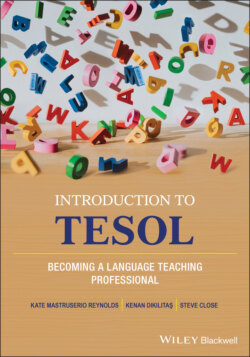Читать книгу Introduction to TESOL - Kate Reynolds - Страница 57
British Council (https://www.britishcouncil.org)
ОглавлениеThe British Council began its work in 1934 as a charitable and diplomatic tool of the United Kingdom. According to the British Council’s 1940–1 Annual Report, its goal was “to create in a country overseas a basis of friendly knowledge and understanding of the people of this country, of their philosophy and way of life, which will lead to a sympathetic appreciation of British foreign policy, whatever for the moment that policy may be and from whatever political conviction it may spring” (British Council, n.d.). The mission of the British Council is “promoting a wider knowledge of [the UK] and the English language abroad and developing closer cultural relations between [the UK] and other countries” (British Council, n.d.). With its broad outreach goals, the British Council today has educational resources for students wishing to learn English, for educators who teach English as a foreign language. Furthermore, it has projects in the arts, culture, science, technology, and community development.
Offices of the British Council are located in over 100 locations worldwide. Its presence appears most prevalent in Africa, Central Asia, East Asia, Europe, and the Middle East. You can find its offices in countries such as:
Africa (e.g., Algeria, Cameroon, Kenya, Libya, Mozambique, Rwanda, Sierra Leone, Uganda, Zambia, and Zimbabwe);
Central America (e.g., Caribbean, Colombia, Mexico);
South America (e.g., Argentina, Brazil, Chile, Peru, Uruguay, Venezuela);
East and Southeast Asia (e.g., China, Hong Kong, Indonesia, Japan, Singapore, and Thailand);
Central and South Asia (e.g., Afghanistan, Azerbaijan, India, Nepal, Pakistan, and Uzbekistan);
Europe (e.g., Albania, Austria, Belgium, Bulgaria, Croatia, Czech Republic, Estonia, France, Germany, Greece, Ireland, Italy, Malta, Norway, Poland, and Ukraine); and
The Middle East (e.g., Bahrain, Iraq, Lebanon, Kuwait, Qatar, Saudi Arabia, United Arab Emirates, and Yemen).
The organization aims to serve educators in foreign language contexts teaching kids, teens, and adults in public and private schools. Professional tutors also enhance their knowledge and skills through their professional development opportunities. In 2018–19, the British Council taught English to nearly 420,000 students and provided professional development opportunities to 77,000 English teachers (British Council, 2019).
The British Council aims to assist teachers of English to speakers of other languages by offering professional development opportunities (e.g., face-to-face and online courses, workshops, and conferences). It has booklets on assessing learning, managing the lesson, and taking responsibility for professional development. In addition to offering CELTA courses, it has courses for TESOL professionals on getting started; engaging with learning technologies, cyber well-being, and digital literacies; understanding teaching for tests; understanding and engaging learners with listening, pronunciation, grammar, reading, speaking, vocabulary, and writing; and general ESL/EFL/ELT instructional methods.
It also supports ESL/EFL teachers by providing online and print resources (i.e., research books and articles), curricula, lesson plans, activities, reading passages, songs, and poems. For example, it has curricula on general interest topics such as the environment, famous authors, beginning language, and cultures. For kids, there are lessons and materials on topics such as the alphabet, friendship, food, family, holidays, and the body. The lesson topics for teens include cycling, tattoos, animation, and bullying. For adults, there are lessons on beauty, left-handedness, money, happiness, and international cities.
